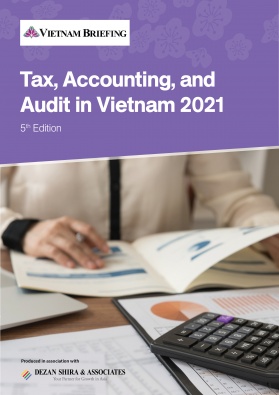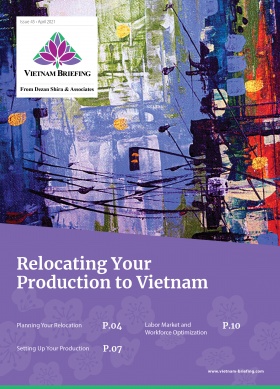Maintaining Operations During Vietnam’s Fourth Wave of the Pandemic
- As the fourth wave of the pandemic takes a toll on Vietnam, the government has issued directives to ensure isolation and maintain production to ensure dual goals of containing the pandemic while ensuring economic activity.
- While businesses are facing challenges, many have adopted these measures to ensure they can maintain production despite lockdowns and movement restrictions.
- Vietnam Briefing looks at how businesses can maintain production while looking to the future and adapting to a new normal.
Vietnam has been severely hit by the fourth wave of COVID-19 resulting in lockdowns, movement restrictions, and thus disruption to supply chains and factory shutdowns. While commercial center Ho Chi Minh City is the largest hotspot, all of the southern provinces have been affected along with strict social distancing measures. Besides the South, movement restrictions have also been introduced in major cities such as the capital Hanoi as well as Da Nang, Hoi An, and Hai Phong.
In this scenario, how can businesses operate and how can they ensure business continuity?
Vietnam’s new wave and restrictions have definitely made it challenging for business given that cases have been increasing and the government has gradually ramped up movement restrictions. Businesses should ensure that they are up to date with the latest government directives and restrictions as these can change frequently.
Government introduces directives for isolation and maintaining production
To main production and maintaining dual goals of epidemic prevention and economic growth, the government asked industrial parks and manufacturing businesses to arrange employees to work at the factory or production site, and eat and sleep on-site if they want to maintain production. This is known as ‘3T’ or ‘three on the spot’. If businesses cannot do this, they must implement a ‘one route, two destinations’ model which means businesses must arrange transportation on one route between the accommodation location such as dormitory, hostel, or hotel, and the work venue. Businesses in certain areas that have not been able to adhere to the new requirements have suspended operations until they have made the necessary arrangements.
Nevertheless, this has posed challenges for businesses that have to respond to these changes in a short amount of time. Businesses have also struggled to ensure sufficient living arrangement facilities and food supplies for employees that are willing to stay on site.
In addition, authorities have mandated businesses to ensure safety as per COVID-19 norms on social distancing and separate working places at production sites.
These include COVID-19 test results before entering production sites as well as transport arrangements between the workplace and hostel/dormitory/apartment/hotel.
Employers are also required to register with the authorities if implementing the 3T or ‘one route, two destinations’ model but these may vary depending on the province and if the business is located in an industrial zone.
Employers should ensure that employees have agreed to live on-site and work before implementing these arrangements. If an employer needs to suspend work for 14 days, they would need to negotiate payment with the employee, but the payments must not be lower than the minimum wage. If the work suspension is more than 14 days, the salary can be negotiated with the employee as well as taking into consideration unpaid leave, annual leave or temporary suspension of the labor contract. Employees are also eligible for certain incentives by the government if their work is affected by the pandemic.
Businesses will have to prepare, adapt, and accept the new normal
These regulations may change at short notice and businesses will have to keep up-to-date with the latest rules.
Nevertheless, some firms have managed to keep production going and have maintained being COVID-19 free. For example, around 3,000 firms in Binh Duong province, the next hotspot after Ho Chi Minh City, have managed to keep workers safe and production going. Most of the firms have managed to maintain operations going for the past 45 days.
Measures including, isolating completely from the outside, maintaining a specified area outside production sites for delivery drivers to pick up goods without any contact, and supplying workers with personal care products and living essentials. Drivers and cooks are also kept in separate areas and are tested frequently. Further, such businesses have also incentivized employees for staying on-site by paying compensation.
As with last year, businesses will have to learn to innovate and adapt and find new ways to continue operations. Rather than depend on government support, businesses would have to accept the new reality and adapt for the long-term. Even with vaccines, pandemic-related variants are likely to come back anytime and anywhere.
Therefore, having an uninterrupted supply chain will be crucial. Experts have said that, if Vietnam controls the pandemic by the third quarter and business activities can return to normal, around 9,000 workers would be needed to cater to demand at the end of the year in garment and footwear as well as increasing production for the lunar new year. Not only this prolonged factory shutdowns may affect demand in the US and Europe who get busy for the Thanksgiving and Christmas holidays.
According to the Ministry of Planning and Investment (MPI), in the first six months of 2021, 70,209 businesses closed – a 24.9 percent increase year on year – with most businesses shut being small scale and less than five years old. In contrast, more than 67,000 businesses were registered up 8.1 percent in the same period, mostly in manufacturing, car and motorbike retail and repair and construction.
Vietnam’s exports had increased by 29 percent in the first half of the year due to a recovering US market and the EU-Vietnam free trade agreement (EVFTA). Smart investors have already been working with suppliers to diversify and firms can negotiate for some items, but in the short-term costs are likely to increase.
About Us
Vietnam Briefing is produced by Dezan Shira & Associates. The firm assists foreign investors throughout Asia from offices across the world, including in Hanoi, Ho Chi Minh City, and Da Nang. Readers may write to vietnam@dezshira.com for more support on doing business in Vietnam.
We also maintain offices or have alliance partners assisting foreign investors in Indonesia, India, Singapore, The Philippines, Malaysia, Thailand, Italy, Germany, and the United States, in addition to practices in Bangladesh and Russia.
- Previous Article US – Vietnam Reach Agreement on Currency, No Tariffs Imposed
- Next Article Vietnam Proposes Draft Decree Tightening Control Over Social Networks







